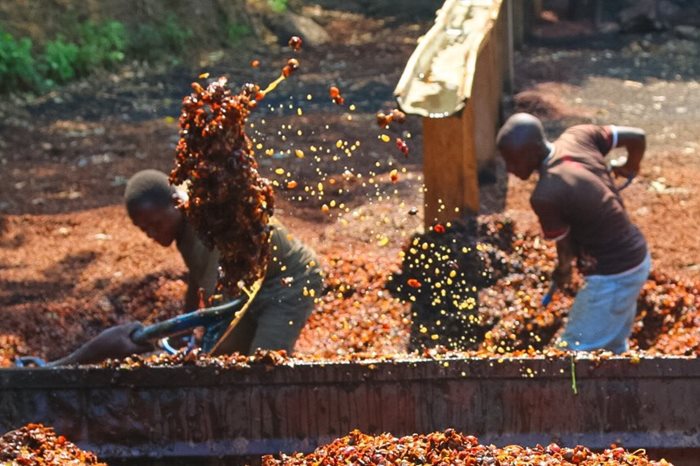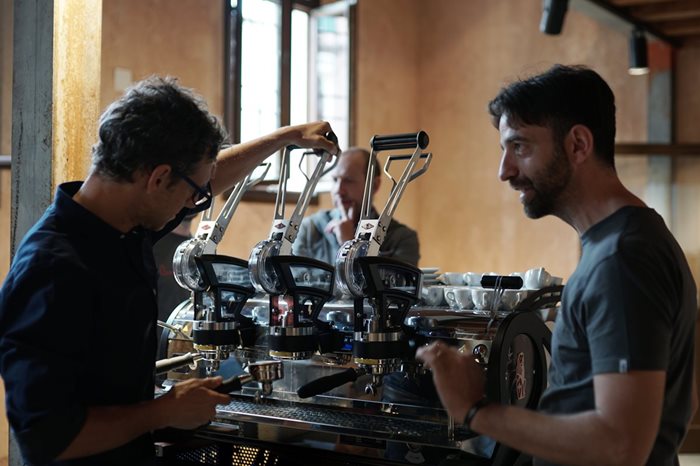Marketing Director at La Marzocco, Chris Salierno, explains the sustainable blueprint behind the legendary espresso machine manufacturer’s operations, how the social component is the coffee industry’s greatest asset and why Italy is ready for its next great wave of coffee development. By Tobias Pearce
.jpg.aspx?lang=en-GB&width=700&height=466)
"As industry leaders we need to work together to create a sustainable, quality-driven eco-system" – Chris Salierno, La Marzocco
It’s been a busy year for La Marzocco. Promoting the sublime Modbar concept, bringing an innovative reimagining of lever technology to market and digitising production processes for efficiency have all been high on the 91-year-old firm’s agenda. But whether investing in coffee research at the University of California, supporting Tanzanian coffee farming communities or trying to understand the carbon footprint behind each espresso shot, Marketing Director Chris Salierno is keen to emphasise sustainability is at the heart of the world-renowned business. “We’ve conducted a general audit by UN standards to see where we are on the sustainability scale and where we can improve,” he explains.
There is a conscious and responsible quest in implementing sustainability initiatives at La Marzocco’s factory and headquarters in the Florentine town of Scarperia. “We’ve recently discovered a fresh water source beneath our land. We’re working toward using it so that we can become self-sufficient with water,” describes Salierno.

The Songwa project in Tanzania works with the local community to improve schools and infrastructure through coffee farming
It’s just one part of La Marzocco’s holistic sustainable strategy across the business. To date the company has banished virtually all plastic components from its machines and a newly reorganised factory line is minimising waste and incorporating recycled materials into all aspects of production. A percentage of the sale of each machine then goes to the
Songwa Project, an initiative run by La Marzocco in Tanzania to support sanitation and education in the coffee growing community. “We’re creating a company that will be around for generations to come” says Salierno.
"We believe that coffee is part of an important ritual, the social component in our industry is so strong"
So, it’s not without a hint of irony that La Marzocco’s latest innovation comes from espresso’s historical roots in lever technology. A game-changer when introduced in the late 1940s, lever technology wasn’t without its drawbacks. Inconsistent, even dangerous to operate (yet eminently capable of producing a superior shot), commercial use was largely confined to history books after Faema introduced its landmark E61 pump system in 1961.
But Salierno says today’s technology can give baristas the best of both worlds. Launched in late 2017, the ‘Leva’ enhances the fundamental principles of ‘pulling’ a shot, including a mechanism that reduces the force necessary for operation by up to 50% and a safety clutch to prevent unexpected spring-back.
So why did La Marzocco take this approach in an era when super-automatics increasingly dominate the espresso machine narrative? “With every iteration of the espresso machine something has been lost from the cup because ultimately the best extraction is one from the lever,” says Salierno. “We’ve worked hard to overcome those challenges and create a machine that reduces strain, creates a more ergonomic experience, is safe and pulls a great espresso.”

Taking espresso back to its roots with La Marzocco's Leva machine
How far technology will enhance, or diminish, the barista profession continues be a point of intense debate in the coffee industry. But Salierno is clear that for La Marzocco there will always be a place for manually making coffee.
“We believe that coffee is part of an important ritual, the social component in our industry is so strong. As long as there’s value in places for people to meet, connect and enjoy coffee then I don’t foresee technology replacing it; technology is here to support,” he says.
The Italian connection
Originally from West Palm Beach Florida, Salierno has called Italy home for the past 20 years. During this time, he’s witnessed a new generation of Italian roasters and independent coffee shops innovating the country’s staunch coffee traditions. “The coffee industry here is old, but I see an evolution in the market. There is a generational change, a group of people who really want to make espresso something much more exciting. The
Milan Coffee Festival could not come at a better time,” he says.
While most of La Marzocco’s sales growth comes from outside Italy in the specialty coffee meccas of the world – Melbourne, Auckland, New York, London – a process of cultural reverse osmosis is now taking place. Having travelled to 3
rd, 4
th and 5
th Wave coffee shops globally and witnessing the fruition of hybridised Italian coffee traditions, the nation’s youth are now bringing that innovation home. “The trick is making it all economically viable,” says Salierno. “An espresso in Italy costs a lot less than an espresso in London – and that makes a difficult proposition for the Italian market.”
Indeed, with the price of a traditional espresso in Italy hovering at just over €1, specialty coffee faces the challenge of convincing Italian consumers that premium beverages can live alongside
il Caffé Italiano. But Starbucks’ entrance into the Italian market with Europe’s first Reserve Roastery is further evidence that it could be time to re-write the Italian coffee rule book for modern times. Getting that right, says Salierno, will rely on creating sustainable businesses to nurture a new talented generation within the coffee industry. “As industry leaders we need to work together to create a sustainable, quality-driven ecosystem for this community of people”.
